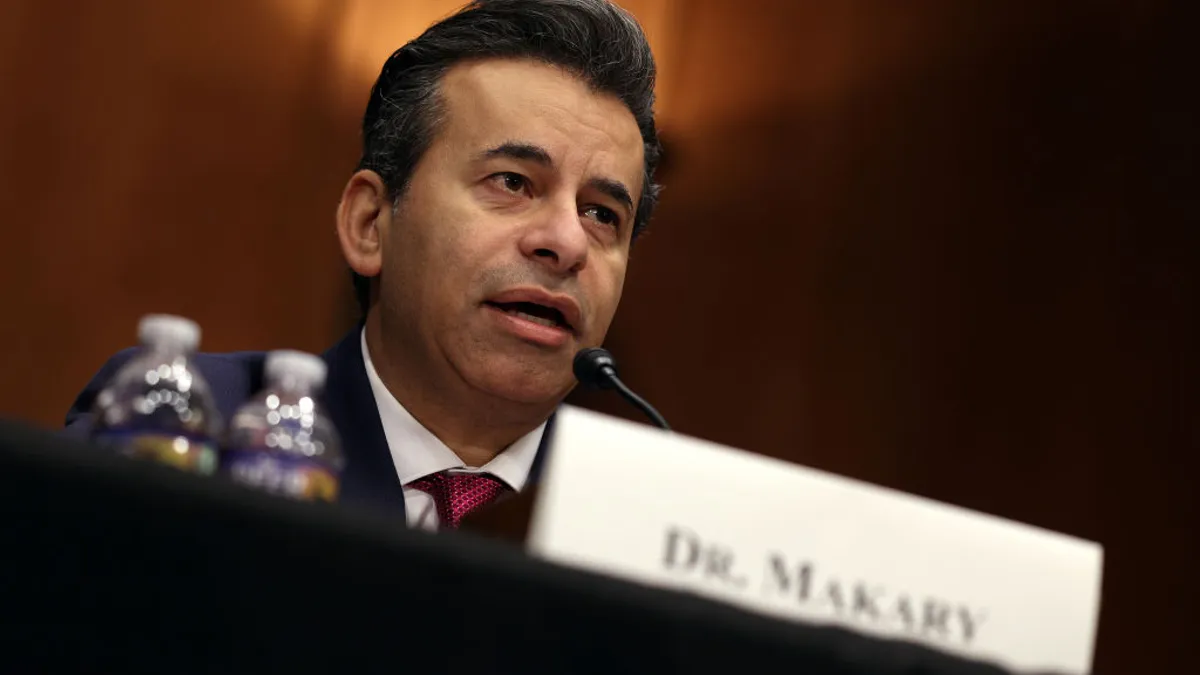Medical device companies that reported during the industry’s third week of earnings continued the trend of returning procedure volumes following the omicron surge in January and February.
Last week’s earnings calls from AtriCure, Axonics and Zimmer Biomet reaffirmed that surgery volumes dropped early in the quarter but rebounded as the quarter progressed. The increase in volumes continued into April.
The trend resembles the environment discussed on earnings calls for companies like Johnson & Johnson, Stryker and Intuitive Surgical in previous weeks.
AtriCure CEO Michael Carrel said on a May 3 earnings call that the omicron variant led to capacity and staffing constraints at hospitals, causing a drop in global cardiac procedures, particularly for “elective” procedures.
Still, the environment stabilized later in the quarter.
“As conditions began to improve in late February and early March, we saw a strong return in procedure volumes and demand,” Carrel said. “This stability has continued into the second quarter,and we are gaining momentum.”
AtriCure, which specializes in atrial fibrillation treatments, posted $74.6 million in revenue in the first quarter, 26% higher than the year-earlier period. As a result, the company raised its 2022 sales forecast to $318 million to $330 million, up from a prior range of $315 million to $330 million.
J.P. Morgan analysts wrote in a May 3 report that “the bounce back in procedures has continued into 2Q and should remain strong over the balance of the year.”
Axonics similarly reported a procedure rebound and raised its 2022 sales forecast. CEO Raymond Cohen praised the company’s performance during a May 5 earnings call, despite the “significant disruption that the omicron variant had on elective procedures and healthcare facilities in January and February.”
The company, which builds devices to treat bladder and bowel dysfunction, reported that revenue gained 41% to $8.4 million in the first quarter.
The omicron surge resulted in hundreds of cases being canceled in January and February, according to Cohen. However, the CEO told investors that the company expects that the “cases will be rescheduled throughout the balance of 2022, and we're very encouraged by the business trends that we have seen for April.”
Still, even after reporting growing revenue over last year and raising their 2022 forecasts, both AtriCure and Axonics posted a drop in their stock prices at the end of last week.
AtriCure’s stock fell 7.2% and 9.2% on May 5 and May 6, respectively. Meanwhile, Axonics dropped 9% on May 5 and 8.1% on May 6.
Medtech companies like Boston Scientific, Zimmer, Medtronic and Abbott Laboratories also had stock price declines at the end of last week, while not as pronounced as AtriCure or Axonics.
AtriCure’s and Axonics’ stock prices fell by 7% and 13% respectively, in Monday morning trading.
“As we mentioned last quarter, the full year visibility on testing demand is still relatively low and the situation is very dynamic. Nevertheless, we still expect revenues to decline sharply in the second half as we move from a pandemic to an endemic environment.”

Jochen Schmitz
CFO, Siemens Healthineers
iRhythm’s comeback continues
After a turbulent 2021 — which included a $200 Medicare rate cut, a CEO resigning after roughly four months on the job and a months-long downward spiral for its stock price — iRhythm Technologies continued its comeback last quarter.
The company reported a 24% rise in first-quarter revenue to $92.4 million. iRhythm raised its 2022 revenue forecast to a range of $410 million to $420 million, up from $400 million to $410 million previously.
On its May 5 earnings call, iRhythm announced that National Government Services updated reimbursement cardiac monitoring codes that the company uses for billing to $329 and $342.
National Government Services is a Medicare Administrative Contractor (MAC), a regional rate setter for the Medicare program, in suburban Chicago that serves the area.
The updated rates are about $100 more than recently revised rates from Novitas Solutions, which is the MAC that processes the majority of iRhythm’s claims. The updated prices are also more inline with iRhythm’s historic rates before Novitas cut them last year.
While Novitas currently processes the majority of iRhythm’s claims, the company said it could utilize National Government Services more.
Douglas Devine, the company’s CFO and chief operating officer, said during last week’s earnings call that National Government Services’ updated rates will have a “small positive impact to revenue starting in the second quarter and increasing into the second half of the year.”
The company’s stock price climbed 5.8% on May 6. However, the shares were down 3.4% Monday morning and iRhythm is still trading below where it began 2021.

There is still an unanswered question regarding national pricing from the Centers for Medicare and Medicaid Services. The agency has passed on the decision for the last two years and left rate setting to the MACs, which resulted in the pricing fluctuations and cast uncertainty over the future for iRhythm and the broader market.
CEO Quentin Blackford did not speculate on where a national price from CMS may end up when questioned during the earnings call but said that iRhythm is continuing to work with the agency.
“Is there an argument that the value could be above even where [National Government Services] is at? There is. But we'll continue to work with CMS and respect their process, answer their questions, and we'll let them arrive at the position they're going to arrive at,” Blackford said. “But we continue to feel good about where this is at. And I think we understand very clearly the sort of value we can deliver, and it could support a higher rate.”
William Blair analysts wrote in a May 5 note that “while there remains some risk as to the agency’s final decision on national reimbursement, we believe several recent updates (especially NGS’s new 42% higher rate) should provide incremental confidence in a positive national CMS rate.”
If the CMS decides to propose a national coverage decision, it will be in the agency’s upcoming proposed Medicare physician fee schedule. Blackford told investors the proposed rule is expected in or around July.
COVID-19 testing
Siemens Healthineers is the latest diagnostic company to report COVID-19 revenue that exceeded internal forecasts. The company’s revenue for rapid COVID-19 antigen test was about 680 million euros (about $715.8 million, as reported on Monday) in its fiscal second quarter.
CFO Jochen Schmitz said during a May 4 earnings call that the results beat internal sales expectations for the first half of its fiscal year by about $315.8 million. According to Siemens, the mark was also a nearly $516 million increase from the previous year’s quarter.
The company increased its revenue forecast for rapid COVID-19 antigen tests in its fiscal year 2022 to $1.37 billion, up from about $736.9 million, primarily due to U.S. demand. Although, much like other diagnostic companies, Siemens is expecting a drop in sales as the year progresses.
“As we mentioned last quarter, the full-year visibility on testing demand is still relatively low and the situation is very dynamic,” Schmitz said. “Nevertheless, we still expect revenues to decline sharply in the second half as we move from a pandemic to an endemic environment.”
Of the approximately $1.37 billion forecasted for rapid COVID-19 antigen sales in its fiscal 2022, the company said about $1.05 billion will come in the first half. According to Siemens, there was a high demand last quarter for its rapid COVID-19 antigen tests in Europe and the U.S., where the test have been on sale since January.
Overall, Siemens reported about $5.75 billion in its second quarter, year-over-year growth of 16% on a comparable basis. Due to increased demand for its COVID-19 tests, the company raised its 2022 revenue-growth forecast to a range of 5.5% to 7.5% on a comparable basis, up from its previous range of 3% to 5%.
Meanwhile, Becton Dickinson reported a decline in COVID-19 testing revenue, one of the few companies to do so this past quarter. COVID-only testing revenues in its second fiscal quarter were $214 million, down from the $474 million in the prior year’s quarter.
CFO Christopher DelOrefice said on a May 5 earnings call that the company forecasts about $450 million in COVID-only testing revenue for its 2022 fiscal year, with a larger contribution coming in the first half.
Overall, the company reported $5.01 billion in revenue in its second quarter, year-over-year growth of about 2%.
Looking ahead
Here are a few companies to watch as the latest earnings season for the medical device industry winds down:
- Vicarious Surgical — May 9 at 4:30 pm ET
- Globus Medical — May 10 at 4:30 pm ET
- Sensonics — May 10 at 4:30 pm ET
- Pear Therapeutics — May 16 at 4:30 pm ET
- Medtronic — May 26 at 8 am ET
Elise Reuter contributed reporting.




















